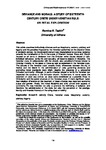Deviance and Morals: a study of sixteenth-century Crete under Venetian rule: A first approach
| dc.contributor.author | Tsakiri, Romina N | |
| dc.date.accessioned | 2017-03-14T15:08:11Z | |
| dc.date.accessioned | 2017-04-10T15:45:43Z | |
| dc.date.available | 2017-03-14T15:08:11Z | |
| dc.date.available | 2017-04-10T15:45:43Z | |
| dc.date.issued | 2007-11 | |
| dc.identifier.citation |
Tsakiri, R.N. (2007) 'Deviance and Morals: a study of sixteenth-century Crete under Venetian rule: A first approach', Crimes and Misdemeanours: Deviance and the Law in Historical Perspective, 1(2), pp.154-174. Available at: 8827https://pearl.plymouth.ac.uk/handle/10026.1/ | en_US |
| dc.identifier.issn | 1754-0445 | |
| dc.identifier.uri | http://hdl.handle.net/10026.1/8827 | |
| dc.description.abstract |
This article examines indicatively offences such as blasphemy, sodomy, adultery and bigamy and the penalties imposed by the Venetian authorities on the island of Crete in sixteenth century. As the sixteenth century was characterised by a strong tendency towards the moralisation of life in the states of Western Europe, State and Church focused on all forms of deviance from the Christian order: issues related to faith, individual behaviour, family life and sexuality, all became objects of discipline. The Venetian state, in collaboration with the church, also penalised offences related to Christian morality, in the island of Crete as well as elsewhere in the Venetian state. The attitude of the Venetian state towards Crete, differences between the city of Venice and the island in the administration of rules governing deviance and promoting moral standards were slight, despite the presence of a substantial Orthodox community. Although, in some offences related to family life Venetian law respected the customs of the Orthodox church. Furthermore, in some cases the treatment of Jews was stricter, as Jews were considered as a possible threat to Christianity and the social structure of the Venetian state. A more significant factor than religious difference on the treatment of these offences was class and economic status and gender. Finally, the moral discipline and strict control over aspects of community life was intended not only to promote the well-being of subjects, and therefore the administration of the state, but also the protection of the prestige, identity and financial interests of the ruling class of nobility. | en_US |
| dc.language.iso | en | en_US |
| dc.publisher | University of Plymouth | |
| dc.rights | Attribution 4.0 International (CC BY 4.0) | * |
| dc.rights.uri | https://creativecommons.org/licenses/by/4.0/ | * |
| dc.subject | Sixteenth century Crete | en_US |
| dc.subject | Venetian state | en_US |
| dc.subject | blasphemy | en_US |
| dc.subject | sodomy | en_US |
| dc.subject | adultery | en_US |
| dc.subject | bigamy | en_US |
| dc.title | Deviance and Morals: a study of sixteenth-century Crete under Venetian rule: A first approach | en_US |
| dc.type | Article | en_US |
| dc.type | Article | |
| plymouth.issue | 2 | |
| plymouth.volume | 1 | |
| plymouth.journal | SOLON Crimes and Misdemeanours |



